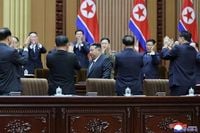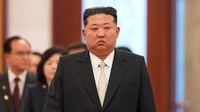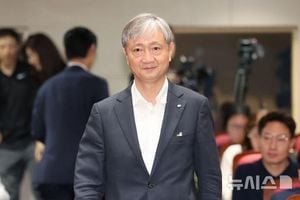North Korean leader Kim Jong Un has reignited international attention with his recent remarks expressing nostalgia for his past interactions with former U.S. President Donald Trump and setting forth new, uncompromising terms for any future diplomatic engagement with the United States. Speaking to North Korea’s Supreme People’s Assembly in Pyongyang on September 21, 2025, Kim made it unmistakably clear: Washington must abandon its longstanding demand for North Korean denuclearization before any talks can resume. This stance, reported widely by state media and international outlets such as the Associated Press and The Wall Street Journal, signals a deepening of the already entrenched stalemate on the Korean Peninsula.
Kim’s comments come at a time of heightened tension in the region. After the collapse of his second summit with Trump in 2019 due to disagreements over U.S.-led sanctions, North Korea has suspended nearly all cooperation with South Korea—a key U.S. ally that played a crucial role in brokering those earlier summits. Since then, the North has accelerated its weapons development, ramped up missile testing, and strengthened alliances with Russia and China, especially in the context of the ongoing war in Ukraine. As reported by the Associated Press, Kim's weapons buildup and his pivot toward Moscow and Beijing have only increased regional and global anxieties.
In his address, Kim reminisced about his summits with Trump, emphasizing, "I still hold good personal memories of President Trump from our first meetings and see no reason not to resume talks with the United States if Washington abandons its delusional obsession with denuclearization." According to The Wall Street Journal, Kim went further, stating, "We will never lay down our nuclear weapons … There will be no negotiations, now or ever, about trading anything with hostile countries in exchange for lifting sanctions." These statements not only reaffirm North Korea’s self-declared status as a nuclear power—a declaration made three years ago—but also challenge decades of U.S. policy, which has consistently made nuclear disarmament a prerequisite for dialogue.
Kim’s outright dismissal of denuclearization as a negotiating point is not just rhetoric. North Korea has continued to test missiles of various ranges, demonstrating capabilities designed to target both U.S. allies in Asia and the continental United States. Analysts, as cited by the Associated Press, suggest that Kim’s strategy is to pressure Washington into recognizing North Korea as a legitimate nuclear power, thereby negotiating from what he perceives as a position of strength. The hope, from Pyongyang’s perspective, is that this recognition will eventually lead to economic and security concessions.
Meanwhile, South Korea finds itself in a precarious position. President Lee Jae Myung has recently departed for New York to attend the United Nations General Assembly, where he plans to address the escalating nuclear crisis and urge North Korea to return to the negotiating table. Yet, as North Korea seeks to bypass Seoul in favor of direct talks with Washington, there is growing concern in the South about losing influence in future negotiations. This anxiety has only intensified since Kim’s announcement last year that he was abandoning North Korea’s long-standing goal of peaceful unification with the South and ordering constitutional changes to designate South Korea as a permanent adversary.
The timing of Kim’s remarks is particularly notable. Former President Trump is scheduled to attend the Asia-Pacific Economic Cooperation (APEC) summit in South Korea from October 31 to November 1, 2025. Media speculation is swirling about the possibility of a high-profile meeting between Trump and Kim at the inter-Korean border, reminiscent of their dramatic—if ultimately unsuccessful—encounter in 2019. However, South Korean officials have indicated that Kim is not expected to attend the summit, and analysts point out that the current strain in inter-Korean relations makes any impromptu meeting unlikely.
Kim’s diplomatic overtures are not limited to the United States. In recent months, he has redoubled efforts to strengthen ties with Russia and China. Earlier in September, Kim appeared alongside Chinese President Xi Jinping and Russian President Vladimir Putin at a grand military parade in Beijing, accompanied by his daughter—a move that has sparked speculation about succession plans within the regime. According to The Wall Street Journal and the Associated Press, both Beijing and Moscow have provided crucial support to Pyongyang, including vetoing recent U.S.-backed sanctions at the United Nations. Furthermore, Kim has reportedly sent thousands of troops and significant military supplies to Russia to aid President Putin’s war in Ukraine, underscoring the deepening strategic alignment among these countries.
For Washington, Kim’s latest pronouncements represent a familiar, yet more entrenched, set of challenges. The U.S. has long maintained that any path to normalized relations with North Korea must begin with verifiable steps toward denuclearization. Kim’s insistence on retaining his nuclear arsenal as an "essential guarantee" for regime survival and the continuation of his family’s dynastic rule directly contradicts this position. As Kim bluntly put it, "The world already knows well what the United States does after forcing other countries to give up their nuclear weapons and disarm." His message is clear: North Korea will not follow the path of Libya or Ukraine.
Within North Korea, Kim’s hardline stance is bolstered by a narrative of resistance and self-reliance. State media has portrayed the nuclear program as non-negotiable, a symbol of national pride and security. This posture is intended not only for external audiences but also to solidify Kim’s authority at home, especially as he maneuvers to secure the regime’s future amid speculation about succession.
Internationally, the shifting dynamics have left many stakeholders uneasy. China and Russia’s willingness to shield North Korea from punitive measures at the United Nations has complicated efforts to pressure Pyongyang back to the negotiating table. Meanwhile, the United States and South Korea face the dual challenge of deterring further North Korean provocations while keeping the door open for potential dialogue. The possibility of a Trump-Kim reunion—should it materialize—would inject fresh drama into an already volatile situation, though few experts expect a breakthrough absent significant shifts in either side’s position.
As the region braces for the upcoming APEC summit and the world watches for any signs of movement, one thing is certain: North Korea’s nuclear standoff remains as intractable as ever. Kim Jong Un’s nostalgia for past diplomacy with Trump may hint at a willingness to talk, but only on terms that Washington, for now, appears unwilling to accept. The impasse, it seems, is set to continue—leaving the Korean Peninsula, and the world, on edge.





